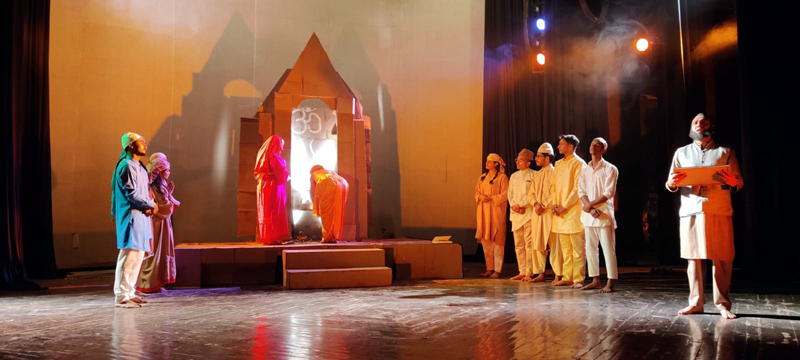Lalit Gupta
Jammu, Feb 26: Vomedh Rangmanch’s presentation of ‘Ateet Ke Sakshi’ while bringing out the pain of exiled Kashmiri Pandits also gave a clarion call to address the misplaced mistrust as both Hindus and Muslims suffered respectively.
Staged on the second day of the ongoing Festival of Plays, organized by Jammu and Kashmir Academy of Art, Culture and Languages, written by Rajesh Roshan Bhat and directed by Rohit Bhat, the play rising above the blame game, reiterated the faith in the age-old communal brotherhood and amity as the bond that can fill the existing void between Kashmiri Hindus and Muslims.
The plot of the play revolved about Gasha ji, a migrant Kashmiri Pandit in Jammu, who yearns to go back and take care of his ancestral temple and talks to his friend Gafoor, who is taking care of the temple. Since Gasha ji’s son Ravi feels disconnected with Kashmir, Gafoor sends son Manzoor, who after reaching Jammu finds that Gasha ji has already passed away. Ravin and Manzoor meet and blame each other. Mnazoor invites Ravi to Kashmir, where he is killed by a greedy land developer. Then Manzoor renovates the temple and arranges to conduct Pooja.
The clarity and tempo of the dialogues by King C Bharti as Gasha ji, Arvin Tickoo as Ravi ji, Ravinder Sharma as Sada Ullah Baksh, Sunny Mujoo as Manzoor Khan, and Ramesh Nirash as Pandit ji, not only brought out the emotions but also bestowed an overall intensity to the performance.
The light and music design, and above all artistic sets conceived and executed by Vir jee Sumbli, provided both physical and psychological ambaience to the presentation.
Tomorrow, on Feb 27,Hill Thespians will perform Pratibha Agarwal’s Hindi translation of Badal Sarkar’s iconic Bengali play ‘Pagla Ghoda’, directed by Sunil Sharma.


